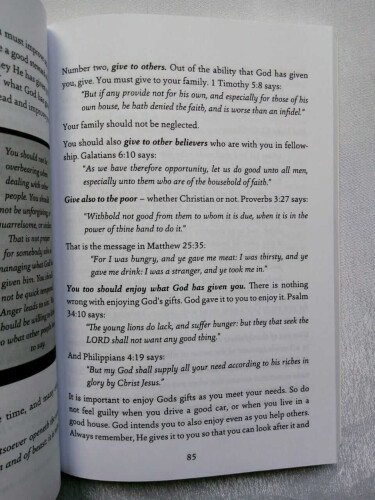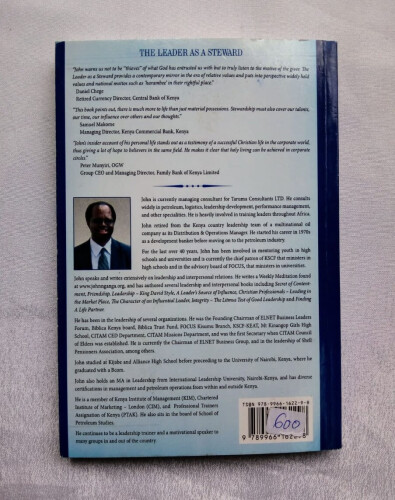THE LEADER AS A STEWARD
$ 5.50 for ONE pcs
Retail / African Duka : 

- TO BUY MORE FROM THIS DUKA VISIT; https://sucbc.smartduka.com
The world has become increasingly materialistic. The lack of integrity and the prevalence of corruption that has invaded the world are as a result of a materialistic mindset and culture. Christians are not exempt; they have joined the bandwagon and now even preach it as gospel.
The opposite of stewardship is materialism. This is what is being preached as the prosperity gospel. This subject has been addressed by Robert M. Franklin, the Presidential Distinguished Professor of Social Ethics at the Candler School of Theology at Emory University. Robert has served as President of the Interdenominational Theological Center and is currently President of the Regional Council of Churches of Atlanta.
In an article adapted from Crisis in the Village: Restoring Hope in African-American Communities (Fortress Press), Robert says he is convinced that the single greatest threat to the historical legacy and core values of the contemporary black church tradition is posed by this “prosperity gospel” movement. That movement, however, is only symptomatic of a larger mission crisis or “mission drift” that has placed the church in the posture of assimilating into a culture that is hostile to people living on the margins of society, such as people living in poverty, people living with AIDS, and immigrants.
However, he says that it is not a new challenge. Christians over the ages have grappled with their relationship to material goods and opportunities since the first century. But in our era, something new and different has emerged. Today, prominent, influential, and attractive preachers and representatives of the church now are advocates for prosperity. Perhaps this could only occur at a time and in a place where two conditions exist. First, Christianity is the dominant faith tradition; second, the nation permits and rewards extraordinary inequalities of wealth and power.
Robert argues that with the wealth gospel preachers, there is a sacred sanction for personal greed, obsessive materialism, and unchecked narcissism. To be a successful (different from faithful) pastor in today’s world is to confront the ever-present temptation to sell one’s soul, compromising one’s vocation and ethical responsibilities, in exchange for or access to wealth. Poor people were central to Jesus’ own self-definition, but they are often relegated to one of the many service programs of today’s corporate church. They are simply another item on the services menu.
Mission also suffers when a church is engrossed in seeking wealth rather than existing to save lost souls. When churches devote more time to building their local kingdoms and less time to nurturing and uplifting poor people or reaching out for the lost, they are caught in a mission crisis.
In these prosperity churches, you are likely to find parking space three blocks from the sanctuary. The church is likely to be in an enormous domed sanctuary. Everything is neat and comfortable. The blue carpet and plush pew covers are welcoming. The huge rotating globe and other props on stage subtly remind one that what happens here is intended for a global television audience.
These preachers are likely to advocate different approaches to prosperity. We should distinguish between three realities: First, the “gospel of prosperity.” Second, the “prosperity gospel.” And third, radical Christian stewardship that I will be discussing in this book.
The gospel of prosperity says, “Greed is good.” This “gospel of prosperity” refers to the cultural ideology that suggests that the accumulation of material possessions, wealth, and prosperity are morally neutral goods that are necessary for human happiness. Robert characterizes it as an ideology rather than merely an idea because it functions like a powerful, unconscious force that does not revise its position in the face of counter-evidence.


-500x500.jpeg)


